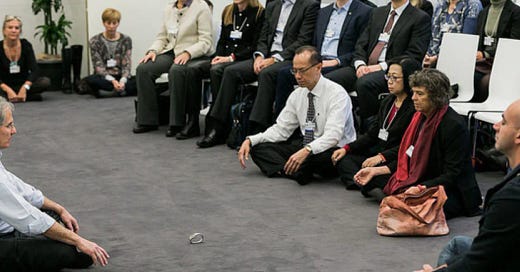Master Yourself Before Leading Others - Atma-Vinigraha
Article 5 of 7 of the Series: Living the Bhagavad Gita in Business
Before you can lead a team, a business, or a movement - you must lead yourself. The Bhagavad Gita calls this principle Atma-Vinigraha: self-mastery. In a world of distractions, ego-driven decisions, and nonstop stimulation, mastering the mind and emotions is not only spiritual wisdom - it’s strategic brilliance.
“Let a man lift himself by his own self alone; let him not lower himself. For this self alone is the friend of oneself, and this self alone is the enemy of oneself.” ~ Bhagavad Gita 6.5
Krishna is clear: your mind can be your ally—or your adversary. Your success, your leadership, your peace - all depend on your ability to govern your own inner world.
Why Self-Mastery is the Foundation of Leadership
We often focus on external skills: public speaking, branding, financial modeling. But the greatest leaders share a less visible trait: self-regulation. They manage their thoughts, emotions, and impulses. They don’t leak energy into ego battles or drama. They know when to act - and when to pause.
Barack Obama, during his presidency, was often praised for his calm demeanor under pressure. He attributed it to his daily discipline: reading, reflection, and family time. He once said, “If I don’t take time to center myself, I can’t be the president people need.”
Self-mastery is emotional intelligence, strategic clarity, and spiritual maturity rolled into one.
What Happens Without It?
Leaders react rather than respond
Decisions are driven by fear or greed
Relationships are sabotaged by ego
Burnout becomes inevitable
When you lack Atma-Vinigraha, your business suffers - not because you don’t know what to do, but because you can’t get yourself to do it wisely.
How to Practice Atma-Vinigraha in Business
Start with Daily Discipline
Build a morning practice. Even 15 minutes of meditation, breathwork, or journaling creates the inner space for clarity.Know Your Triggers
Learn what throws you off balance. Is it rejection? Criticism? Being ignored? Awareness is the first step toward mastery.Build the Pause Muscle
Train yourself to pause before reacting. That one second of stillness can save a deal, preserve a relationship, or spark a new idea.Focus on Inner Wins
Instead of asking, “Did I close the deal?” ask, “Did I stay centered, kind, and clear?” These are the wins that matter.
“He who has conquered himself is a far greater hero than he who has defeated a thousand enemies.” ~ The Dhammapada
Real-World Example #1: The Mindful Startup Founder
Khalil was building a health tech platform and juggling investor demands. He found himself snapping at his team, losing sleep, and making rushed decisions. A mentor introduced him to mindfulness meditation. Within weeks, his presence shifted. He stopped reacting. His meetings improved. The product launch was delayed - but wildly successful.
Real-World Example #2: The Emotional Turnaround Consultant
Sandra, an executive coach, specialized in helping burned-out CEOs. Her method? Get them to master their morning routines, emotions, and self-talk before tackling strategy. “Once they’re aligned inside,” she said, “they lead with 10x the impact.”
Real-World Example #3: The Restaurant Manager Who Turned Things Around
Jose ran a struggling bistro. Staff morale was low. He realized the common denominator was his stress. He began a gratitude practice, listening more than speaking. Within months, the atmosphere transformed. Revenue followed.
Real-World Example #4: The Young Freelancer Who Learned to Say No
Nina was overwhelmed by client demands and undercharging for her work. Through self-reflection, she realized she was people-pleasing out of fear. She created new boundaries, raised her rates, and found deeper respect - from herself and her clients.
Real-World Example #5: The CEO Who Meditates
Marc Benioff, founder of Salesforce, credits meditation and spiritual practice for his leadership style. “You have to cultivate a beginner’s mind,” he said. “The best leaders are the most self-aware.” Read this short article on other execs who regularly practice meditation.
Self-Mastery is Self-Liberation
Atma-Vinigraha doesn’t mean controlling every thought or being rigid. It means becoming conscious of your inner life so you’re no longer a slave to it. It means leading from your higher self - not your insecurities.
Krishna reminds Arjuna:
“For one who has conquered the mind, the mind is the best of friends; but for one who has failed to do so, the mind will remain the greatest enemy.” ~ Bhagavad Gita 6.6
This is why inner work is not optional for leaders - it’s essential. It’s what allows you to hold space for others, make wise decisions, and model integrity.
Final Reflection
Your business is a reflection of your consciousness. The more aware, centered, and integrated you are, the more your work will radiate trust, excellence, and vision.
Next time you’re about to send a heated reply, skip your morning routine, or make a fear-based decision, ask, “Am I leading from ego - or from essence?”
This is Atma-Vinigraha. This is the heart of leadership.
This comprehensive series aligns with my leadership training initiative, "Leading with Empathy," and my personal growth course, "The Path Of Meditation that Leads to Living ALOHA."
If you are interested in reading The Bhagavad Gita, I recommend the version translated by Eknath Easwaran.
While my articles are freely accessible, if you derive value or wisdom from them, kindly mull over becoming a paid subscriber. Mahalo!




